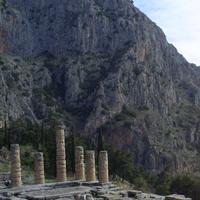Ulixes 5 (Ritchie's Fabulae Faciles)
Ulysses 5 (Ritchie's Easy Tales)
Cyclopes autem pastores erant quidam qui insulam Siciliam et praecipue montem Aetnam incolebant; ibi enim Volcanus, praeses fabrorum et ignis repertor, cuius servi Cyclopes erant, officinam suam habebat.
The Cyclopes, however, were some shepherds who inhabited the island of Sicily, and chiefly Mount Etna; for there Vulcan, the chairman of the architect's and the inventor of the fire, whose slaves were the Cyclops, had his factory.
Graeci igitur simul ac monstrum viderunt, terrore paene exanimati in interiorem partem speluncae refugerunt et se ibi abdere conabantur.
The Greeks, therefore, as soon as they saw the monster, almost paralyzed by terror, fled to the innermost part of the cave, and endeavored to hide themselves there.
Polyphemus autem (sic enim Cyclops appellabatur) pecus suum in speluncam compulit; deinde, cum saxo ingenti portam obstruxisset, ignem in media spelunca fecit.
But Polyphemus (for he was so called a Cyclops) drove his cattle into a cave; then, when he had blocked the gate with a huge stone, he made fire in the middle of the cave.
Hoc facto, oculo omnia perlustrabat, et cum sensisset homines in interiore parte speluncae esse abditos, magna voce exclamavit: "Qui homines estis?
Having done this, he scanned all things with his eye, and when he perceived that men were hid in the inner part of the cave, he cried out with a loud voice: Who are you men?
Mercatores an latrones?"
Merchants or robbers?
Tum Ulixes respondit se neque mercatores esse neque praedandi causa venisse; sed a Troia redeuntis vi tempestatum a recto cursu depulsos esse.
Then Ulysses replied that he had neither been merchants nor had come for the purpose of plundering; but that they had been driven from the right course by the force of storms, when he was returning from Troy.
Oravit etiam ut sibi sine iniuria abire liceret.
He also prayed that he might be allowed to go away without injury to him.
Tum Polyphemus quaesivit ubi esset navis qua vecti essent; sed Ulixes cum sibi maxime praecavendum esse bene intellegeret, respondit navem suam in rupis coniectam omnino fractam esse.
Then Polyphemus asked where the ship was and where they were riding; but Odysseus, when he perceived that it was well to take great precautions against himself, replied that his ship had been thrown into a rock, and had been broken entirely.
Polyphemus autem nullo responso dato duo e sociis manu corripuit, et membris eorum divulsis carnem devorare coepit.
But Polyphemus, without giving an answer, seized two of his allies by the hand, and began to devour the flesh, tearing apart their limbs.

